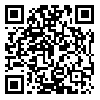BibTeX | RIS | EndNote | Medlars | ProCite | Reference Manager | RefWorks
Send citation to:
URL: http://jdisabilstud.org/article-1-2793-en.html
2- Associate Professor, Department of Psychology, Arak Branch, Islamic Azad University, Arak, Iran
3- Assistant Professor, Department of Psychology, Mahallat Branch, Islamic Azad University, Mahallat, Iran
Abstract
Background & Objectives: In today's world, learning disabilities are recognized as the most important factor in the weakness and dropout of students in primary school. Among students’ problems are learning disabilities, reading difficulties, and intolerability of uncertainty. Lack of treatment and control of children, in addition to creating numerous problems at the family, school and community level, future children also face challenges. Thus, it can be seen how these special education programs are important and effective for these children. Cognitive rehabilitation therapy and play therapy are among the most important programs in treating students with learning disabilities. Therefore, this study aimed to compare the effectiveness of cognitive rehabilitation therapy and play therapy on reading performance, reading problems, and intolerability of uncertainty and evaluate the persistence of its effects over time.
Methods: The research method was quasi–experimental with a pretest–posttest and follow–up test (three weeks after the implementation of treatment protocols) which was performed with two experimental groups and one control group. The first independent variable was cognitive rehabilitation intervention that was applied to the first experimental group and the second independent variable was cognitive play therapy which was performed on the second experimental group. Also, the control group did not receive any training. The study’s statistical population included all female students with special learning disabilities with reading defects in the fourth grade of elementary school studying in Hamadan primary schools, Iran, in the academic year of 2019–2020. The sample size was equal to 45 students in three groups that were selected by using Cochran's formula and convenience sampling method. They were randomly divided into groups of 15 into three groups: two experimental groups (cognitive rehabilitation therapy and play therapy) and one control group. The tools used to measure variables in three groups and three stages were 3 standard questionnaires: Uncertainty Intolerance Scale (UIS) (Freeston et al., 1994), Problem Type Assessment Table (Tabrizi et al., 2018), Reading and Dyslexia Test (NEMA) (Kormi Nouri & Moradi, 2005). For data sorting, central and dispersion indicators such as mean and standard deviation, and for data analysis, repeated measures analysis of variance and Tukey and Bonferroni post hoc tests were used. The mentioned statistical analyzes were performed in SPSS software version 25. The significance level of the tests was considered 0.05.
Results: The effect of time, group, and interaction of time and group on the variables of reading performance, reading problems, and uncertainty intolerance were significant (p<0.001). The average reading performance variables and reading problems and intolerance of uncertainty were significantly different between the cognitive rehabilitation therapy and play therapy groups with the control group (p<0.001). In both experimental groups, there were significant differences between the pretest, posttest, and follow–up regarding the mentioned variables (p<0.001). However, there was no significant difference between the posttest and the follow–up regarding the mentioned variables, indicating the persistence of the effectiveness of both interventions in the follow–up phase (p>0.05). Also, a significant difference was observed between the effect of cognitive rehabilitation and play therapy on the aforementioned variables in the posttest and follow–up (p<0.001).
Conclusion: Both methods of cognitive rehabilitation therapy and play therapy are effective in increasing reading performance, reducing reading problems, and reducing uncertainty intolerance. But in comparison, the effect of cognitive rehabilitation therapy in improving reading performance is more than play therapy, while play therapy is more effective than cognitive rehabilitation therapy in reducing reading problems and reducing intolerability of uncertainty.
| Rights and permissions | |
 |
This work is licensed under a Creative Commons Attribution-NonCommercial 4.0 International License. |




